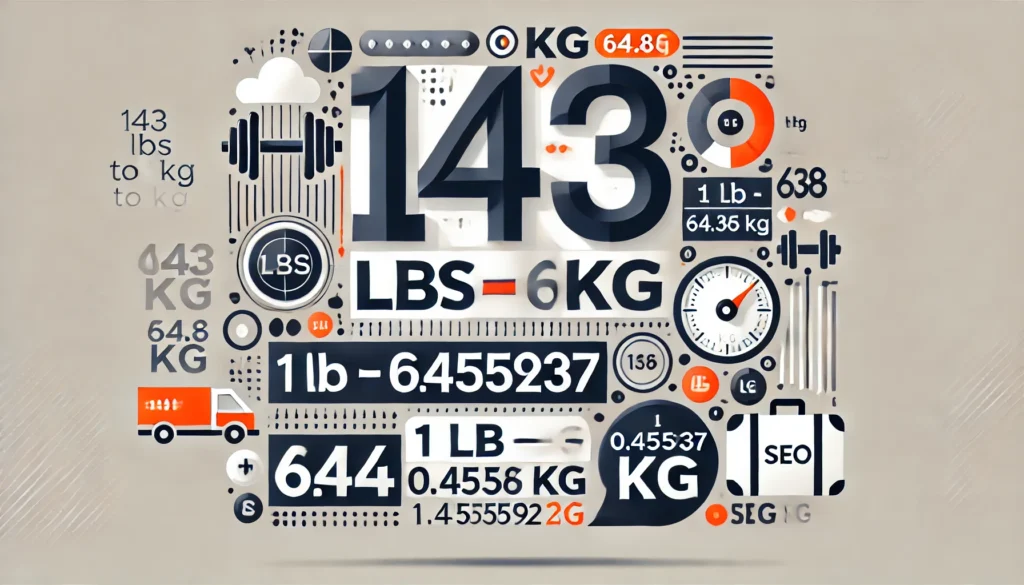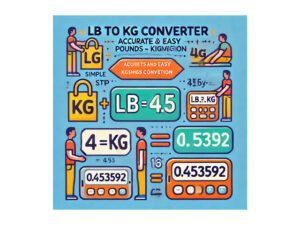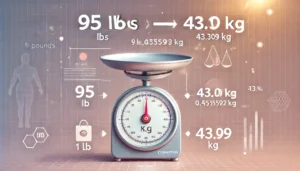Understanding how to convert weight from pounds to kilograms is essential in a world where different regions use varying measurement systems. Whether you’re traveling, working on a fitness plan, or just curious, learning how to convert 143 lbs to kg can be quite helpful. Let’s explore the process in a simple and engaging way.
Why Convert Pounds to Kilograms?
Pounds are part of the Imperial system, widely used in the United States. In contrast, kilograms belong to the Metric system, which is more common internationally. For example, medical, scientific, and athletic fields typically use kilograms due to their standardized precision.
So, when someone says they weigh 143 pounds, people in most countries might ask, “How many kilograms is that?”
The Conversion Formula
To convert pounds to kilograms, the standard formula is:
Kilograms = Pounds × 0.45359237
Using this formula, converting 143 lbs to kg looks like this:
143 × 0.45359237 = 64.8647 kg
Rounded to two decimal places, the result is:
143 lbs = 64.86 kg
This is your straightforward conversion, but let’s break it down further for deeper understanding.
Step-by-Step Breakdown
- Start with the pound value – 143 lbs.
- Multiply by the conversion factor – 0.45359237.
- Get the result – approximately 64.86 kilograms.
This calculation can be done manually, or you can use any online converter or calculator for faster results.
Real-Life Examples of 143 lbs in kg
Let’s say you’re shopping for weights in Europe, and all packaging is labeled in kilograms. If your fitness plan suggests lifting 143 lbs, you’ll need to find something close to 64.86 kg.
Or perhaps you’re filling out an international health form. In that case, knowing your weight in kilograms is a necessity, not just a curiosity.
Understanding the Metric Advantage
The Metric system simplifies many measurements because it’s based on multiples of 10. Unlike pounds, where 16 ounces equal a pound, kilograms are neatly divided into grams (1,000 grams = 1 kilogram).
Thanks to this, converting between units like milligrams, grams, and kilograms becomes far easier in scientific calculations.
Tips for Accurate Conversion
- Always use the full conversion factor (0.45359237) for precise results.
- Round to two decimal places for general use, especially when entering values into forms or reports.
- Use digital tools when dealing with complex or repeated conversions.
Moreover, understanding these basic math principles adds to your general knowledge and improves your global communication skills.
Quick Reference Table
| Pounds (lbs) | Kilograms (kg) |
|---|---|
| 140 | 63.50 |
| 141 | 63.95 |
| 142 | 64.41 |
| 143 | 64.86 |
| 144 | 65.31 |
| 145 | 65.77 |
This table helps you compare values quickly without repeating the formula every time.
Common Use Cases for Conversion
- Fitness Tracking: Gyms across the world often use kilograms.
- International Travel: Baggage allowances are frequently listed in kilograms.
- Medical Reports: Most healthcare systems outside the U.S. use metric values.
- Cooking and Recipes: Some ingredients need precise conversions for perfect results.
Final Thoughts
Learning how to convert 143 lbs to kg is not just about solving a math equation. It opens the door to understanding global standards and helps in various real-world scenarios. The next time you see your weight in pounds, you’ll know exactly how to interpret it in kilograms.
Whether you’re traveling, measuring luggage, or completing a fitness chart, this simple yet powerful conversion formula keeps you informed and prepared.
And now that you know the answer — 143 lbs equals 64.86 kg — you’re equipped with a practical skill that’s both functional and relevant.





